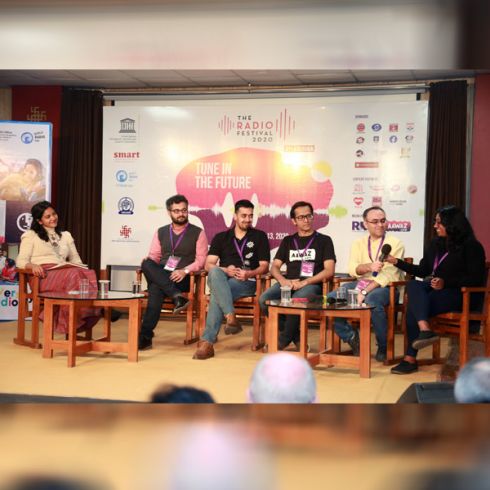
MUMBAI: The Radio Festival, organized and initiated by Seeking Modern Applications for Real Transformation (SMART) in collaboration with UNESCO had a bouquet of interesting panels on poetry, podcast, music and storytelling.
With the theme Tune in The Future, a session on podcast industry, its boom and challenges was inevitable. Is the podcast industry a threat to radio? Has it started questioning the relevance of radio in a digital world? Is content more easily accessible and diverse? Is consumption easier? Is this the choice of the millennials? Is this boom a phase that will soon settle down or is it actually the future?
Podcasters from across India deliberated on these questions and much more in a vibrant, young and engaging panel at TRF 2020.
The panel on ‘The Podcast Revolution’ discussed extensively the myths around podcast being elitist in its content. They shared their own stories and programmes which included Panchtantra ki Kahani, social issues, news, and politics. They decoded the myths around the digital space and talked about the trends in this emerging audio industry.
The panelists at the session included Nishant Kumar, head of sales and partnership, Hubhopper; Aman Goklani, director of podcasts and partnerships, Jio Saavan; Sreeraman Thiagarajan, founder Aawaz.com; Mae Mariyam
Thomas, founder of Maed in India and Naga Subramanya, founder of Passion People Podcast with Neha Mathews from The Indian Express as the moderator.
Panelists talked about the growing trend of podcasts, despite the small market in India. Mae felt that podcasters are “riding the crest of a wave” in terms of the number of people listening to the podcasts. She said that there were more voices on podcast than there were in radio.
Consistency in podcast is the key to build loyal audiences. To a question posed by Neha regarding loyalty, Goklani said, “If you are going to go to the gym everyday of your life, you will have the muscle strength that you need. If you suddenly stop doing that, you are going to lose it. Podcasting is something similar. With it you need to be very consistent. This is key to podcasting, which most people tend to not understand or miss. So when you do podcasting continuously you are building a base which is where you have the loyal audience and people keep tuning back to it.”
Panelists argued that the podcasts are “on-demand radio” which has given space to different voices without compromising on the ‘intimacy’ of the medium. Expressing the intimacy of podcaster with the listener and reasons for brands being attracted to the podcasts for advertising, Kumar said that the advertising on podcasts comes out as “a referral by a friend.”
“Where podcasts stand out is that the person who is listening is fully engrossed into what you are offering them as value within your content. The listener is coming week after week and is loyal to the host. So when you are advertising something like a pair of socks, it doesn’t come in your face like advertising but as a referral from a friend because you are listening to the person day in and day out. That is the merit of a podcasting space,” said Kumar.
Speaking about the popular genres of podcasts, Thiagarajan said “humour undisputedly takes the lead, followed by stories, which is followed by spiritual and devotional content.” He added that even as he did not promote the podcasts much outside India initially, a large chunk of the viewership also came from the United States.
Subramanya claimed the trend for local languages exists because people outside India are desperate to have a connection with their motherland and podcasts in local languages provide them the opportunity. “People outside India are looking to get a connection to their motherland and here is a content (regional language podcasts) which hits that chord. Now is the time for us to make content that has mass appeal,” said Subramanya.
Neha Mathews, who herself has produced several podcasts including '3 Things', the elections special series 'Express Elections' and the 'Awaaz Do' limited series on free speech, as well as shows on technology, said that content would drive the market for podcasts. With a number of private channels getting into podcasts it would be challenging for individuals to carry on, as funding will always be an issue.
Panelists said that it is possible to generate money out of podcasts however, the “loyalty is valued over numbers”, said Thomas.
Contradicting the notion that only a niche audience listens to podcasts, Mae said, “You do not know what might do really well (in the digital world) today. I recently discovered ‘Chicken Leg Piece’ which is one of the most popular accounts on Tik Tok. This is a guy who eats a chicken leg-piece and says, “chicken leg piece” while eating it and he is one of the most popular people. So what do you call ‘niche’ now? ‘Niche’ does not exist!”